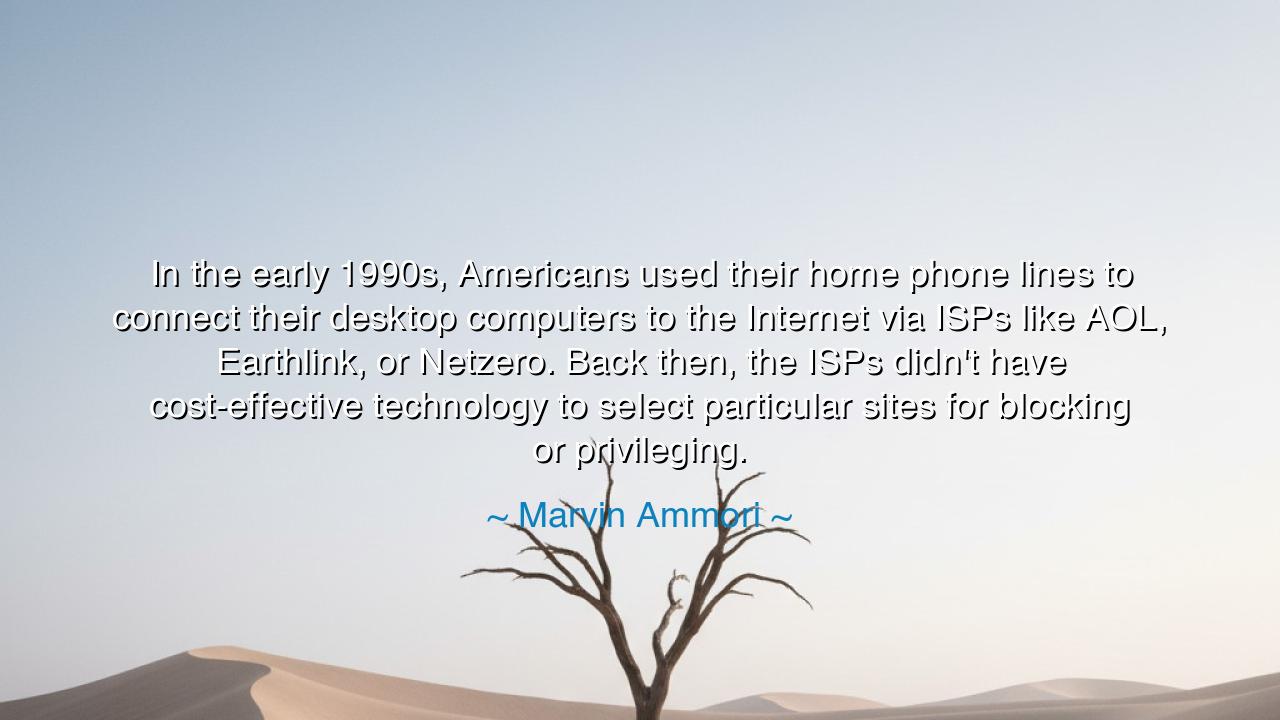
In the early 1990s, Americans used their home phone lines to
In the early 1990s, Americans used their home phone lines to connect their desktop computers to the Internet via ISPs like AOL, Earthlink, or Netzero. Back then, the ISPs didn't have cost-effective technology to select particular sites for blocking or privileging.






In the reflective and instructive words of Marvin Ammori, we find not merely a record of history, but a parable of freedom, connection, and the humble beginnings of a revolution: “In the early 1990s, Americans used their home phone lines to connect their desktop computers to the Internet via ISPs like AOL, Earthlink, or Netzero. Back then, the ISPs didn't have cost-effective technology to select particular sites for blocking or privileging.” These words carry the echo of a simpler age, when the Internet — now a vast empire of influence — was but a newborn, fragile and unclaimed. Ammori, a scholar and defender of digital rights, reminds us that the first steps of this global network were unshaped by greed or control. It was a time of open doors and boundless possibility — when humanity, reaching through the crackling hum of dial-up, first touched the infinite.
To understand his meaning, we must return to that moment in history, when connection came not through silent wireless waves, but through the singing of phone lines — that metallic hymn that marked the gateway between isolation and discovery. In those days, the Internet Service Providers (ISPs), such as AOL, Earthlink, and NetZero, were the primitive ferrymen of the digital sea. They carried data slowly, yet freely. Their tools were crude, and thus, their power limited — they could not yet choose who would speak, nor which voices would be silenced. The early Internet was democracy in its purest form, not by intention, but by technological limitation. From this unshaped clay, the ideals of net neutrality — equality of access, freedom of speech, and openness of information — would later be forged.
The origin of this quote lies in Ammori’s work as a constitutional scholar and advocate for digital freedom. He speaks as both historian and guardian, reminding us that the virtues we now fight to preserve were once the natural state of things. The early Internet was not bound by gatekeepers; it was an untamed landscape of exploration. People logged on not for profit, but for curiosity — to learn, to speak, to share. In the absence of corporate control, innovation flourished. It was from this unregulated soil that the great digital empires — search engines, online marketplaces, and social platforms — first took root. And yet, Ammori’s tone carries warning as much as wonder: the innocence of that time, he tells us, did not last.
Consider, as an illustration, the rise and fall of Napster, one of the earliest peer-to-peer file-sharing networks. It embodied the wild spirit of the Internet’s early days — the belief that information and art should flow freely, unrestricted by barriers. But as the digital world matured, forces of control — legal, economic, and political — began to enclose it. Napster was silenced, and with it ended a chapter of Internet idealism. What began as a frontier of freedom became increasingly governed by walls and permissions. Ammori’s remembrance of the early 1990s is thus a lament for lost innocence, a call to remember that the power to connect was once shared by all, not sold by the few.
He also speaks to a deeper truth about technology and power. In the beginning, when tools are simple, people are equal. But as technology grows in sophistication, so too does the potential for domination. The same systems that once united us now carry the power to divide, censor, and manipulate. The freedom of the early Internet, born from technical limitation, now requires moral vigilance to preserve. What was once natural must now be defended by principle. Ammori’s words are therefore not nostalgic but prophetic — a reminder that liberty, whether in nations or networks, is easiest to lose when it is most taken for granted.
Yet there is hope in his reflection. The spirit of the early Internet — open, curious, unfiltered — still dwells in the hearts of its users. It lives in the coders who build open-source software, in the educators who share knowledge freely, and in the citizens who fight for digital rights across the globe. Like the philosophers of old who gathered beneath the olive trees to discuss truth, modern thinkers gather online to exchange ideas without borders. Ammori’s teaching urges us to protect this sacred space — not for nostalgia’s sake, but for the preservation of freedom itself.
Let this, then, be the lesson for the generations that follow: guard the open web as you would guard liberty itself. The Internet is not merely a tool of convenience — it is a mirror of humanity’s collective mind. Use it not as a cage of distraction, but as a bridge of understanding. Support the principles of openness, resist censorship, and remember that every click, every word, every connection is a thread in the tapestry of shared human knowledge.
For as Marvin Ammori reminds us, the greatness of the Internet’s birth lay in its simplicity, its equality, its freedom. And though the world has changed, the ideals of that beginning need not fade. Like the ancients who preserved wisdom through generations, we must now become the stewards of digital truth — ensuring that the vast and mighty web, born from the humble hum of phone lines, remains forever a realm where all voices may speak, and all minds may be free.






AAdministratorAdministrator
Welcome, honored guests. Please leave a comment, we will respond soon